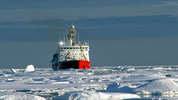Benthic communities and natural and anthropogenic impacts
The Witte group investigates the functioning of benthic marine ecosystems and benthic-pelagic coupling from the deep ocean floor to the intertidal, with a current focus on consequences of both anthropogenic activities and climate change.
This often includes the development of new research technologies, and one focus of ongoing work is the development of a pressurised coring, incubation and cultivation system for the study of biogeochemical processes and piezophile microorganisms from the deep seafloor under varying environmental conditions (pH, T, O2 etc.).
Sea ice is a unique feature of polar marine ecosystems and the fact that small temperature differences can have large effects on the extent and thickness of this sea ice makes polar marine ecosystems particularly sensitive to climate change. The group’s work on climate change impacts on benthic ecosystem functioning is therefore centred in the Canadian High Arctic where change is particularly rapid.
But we also work closer to home: Aberdeen is often referred to as the ‘oil capital of Europe’, and with hydrocarbon extraction now occurring down to 1100 m in the Faroe Shetland Channel, a need arises to understand the consequences of accidental releases in Scottish deep water environments in order to improve monitoring and optimize response measures after a spill. Several ongoing projects therefore investigate the rates and pathways of hydrocarbon degradation in Scottish Waters, as well as the microorganisms involved.
Benthic ecosystems such as deep water sponge grounds and cold water coral reefs are oasis of biodiversity, but particularly vulnerable to anthropogenic disturbance. Understanding the functional role of sponges in these unique ecosystems is another focus of our work.
In many cases, stable isotope tracing experiments, often carried out in situ at the deep-sea floor, help us track the pathway of organic matter, in particular C and N, through the benthic community and thus understand the spatial and temporal dynamics of biological and geochemical transformations of matter in benthic and benthopelagic food webs.
